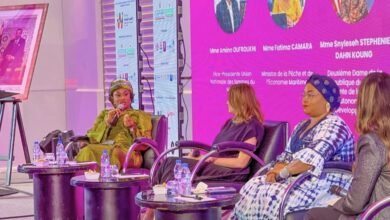African Experts Reflect on Royal Vision for Continental Transformation

As part of the launch of The New Africa Magazine’s special royal edition, the National School of Business and Management (ENCG) Casablanca hosted an expert panel focused on sovereign leadership, diplomacy, and continental development. Organized in partnership with the International Center for Diplomacy and the International Observatory for Peace, Democracy and Human Rights – Geneva, the session brought together prominent Moroccan and African voices and was moderated by journalist Said Maouaj.







Dr. Gift Chidimma Nnamoko Orairu, Publisher of The New Africa Magazine, reaffirmed the magazine’s unwavering support for Morocco’s sovereignty over its Southern Provinces, describing the Moroccan Sahara as “a gateway for trade, cooperation, and pan-African connectivity.” She praised the Royal leadership that turned a long-standing dispute into an opportunity for continental integration.

Karima Rhanem, President of the International Center for Diplomacy and Global Managing Editor of the magazine, introduced the “Strategic Model of Sovereign Foresight” based on ten pillars, including human-centered development, Atlantic strategy, moderate religious leadership, and crisis preparedness. She described it as “a Moroccan model with an African soul — anchored in sovereignty, open to the world, and oriented toward the future.”
Smail Kabbaj, Acting Director of ENCG Casablanca, opened the event by emphasizing the school’s civic role in shaping a generation aligned with His Majesty’s vision for Africa. He underscored the importance of partnerships between academia and institutions of influence and announced a new collaboration between ENCG and The New Africa Global Economic Institute to strengthen leadership education across the continent.

Dr. Mustapha Sarhiri, Doctor in Public Law and Political Science, highlighted the three foundational dimensions of Morocco’s strategic direction under His Majesty King Mohammed VI: spiritual security, Atlantic integration, and justice for Moroccan women. He emphasized the unique Moroccan model of moderate Islam as a pillar of both national unity and soft power across Africa, anchored in coexistence and institutionalized through the Mohammed VI Institute for Imams and the restoration of religious heritage.
Sarhiri also underlined the transformative role of Atlantic cooperation, referencing key infrastructure initiatives like the Nigeria–Morocco Gas Pipeline and the Dakhla Atlantic Port. On gender justice, he pointed to the constitutional reforms and the rise of female legal professionals as reflections of the King’s commitment to inclusive governance. He called these reforms “foundational pillars of a sovereign African renaissance that harmonizes tradition and progress.”

Maître Souad Batal, lawyer and President of the Women and Children Committee at the African Organization for Human Rights, focused her intervention on Morocco’s legislative advancements in women’s rights. She traced a legal trajectory from the 2004 Family Code reform to the criminalization of gender-based violence through Law 13-103, emphasizing their combined impact on legal empowerment and societal equity.
Batal further positioned Morocco as a regional actor in gender advocacy through South–South cooperation, especially in sharing legal models with African states. She stressed the importance of integrating women’s rights into broader human rights diplomacy and recommended increased regional legal exchange platforms. “Empowering women,” she concluded, “is not just a social duty, but a strategic necessity for continental justice.”

Amine Sami, expert in territorial development and strategic planning, introduced the concept of “Scarcity Diplomacy” as a Moroccan model for converting underutilized resources into strategic assets. He explained how Morocco identifies neglected or undervalued spaces—such as the Cocody Lagoon in Côte d’Ivoire—and transforms them through integrated urban and environmental investments. These spaces, once considered liabilities, become levers for sustainable competitiveness and territorial branding.
Sami further emphasized that this model is guided by the early identification of “signals of the future”—subtle economic, ecological, and social indicators that anticipate regional needs. He presented Dakhla as a flagship example: once a remote outpost, now a rising Atlantic hub. “By aligning vision with action,” he said, “Morocco demonstrates how forward-thinking development becomes a tool of influence and regional positioning.”

Nidal Benali, youth policy specialist and ICESCO Peace Ambassador, explored the evolution of Moroccan youth from independence-era activists to central agents of today’s development strategy. He emphasized that under King Mohammed VI, youth are no longer passive recipients of opportunity but recognized as leaders of change, with the 2011 Constitution institutionalizing youth participation and consultation mechanisms.
Benali also highlighted major national and continental milestones—such as AFCON 2025 and the 2030 World Cup—as platforms for youth inclusion and leadership. He called for more youth-centered public policies and programs across Africa. “Empowerment,” he stressed, “is not a gift. It is a responsibility handed to the generation that will define Africa’s future.”

Salahadine Haggar, PhD candidate in Public Law and expert on the Sahel, analyzed the implications of the Atlantic Initiative announced by His Majesty. He presented it as a game-changing geopolitical framework that grants landlocked Sahel countries access to maritime trade and development corridors. The initiative, he argued, represents a sovereign African response to the chronic marginalization of the region.
Haggar emphasized that Morocco’s vision redefines regional security not through military coalitions, but through infrastructure, solidarity, and economic interdependence. By reframing the Sahel as a zone of opportunity and not just crisis, Morocco promotes a model of security anchored in dignity, cooperation, and sovereign agency. “Peace,” he concluded, “is no longer the absence of war — it is the presence of opportunity.”
The panel closed with a shared recognition that the Royal vision offers a replicable model of sovereign development for Africa—one that balances identity, innovation, and inclusion. A full white paper of the policy recommendations will be published in an upcoming issue of The New Africa Magazine.





